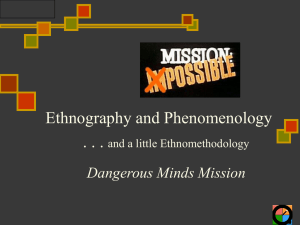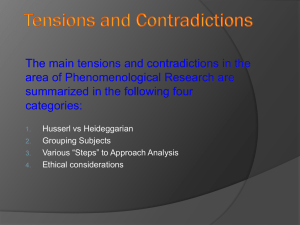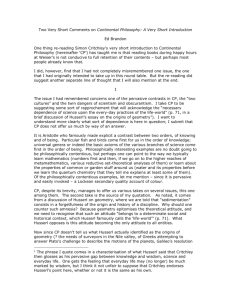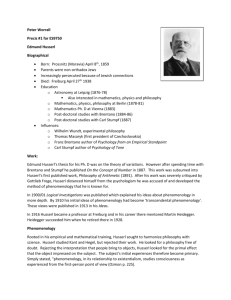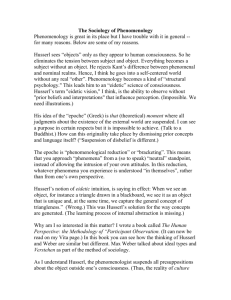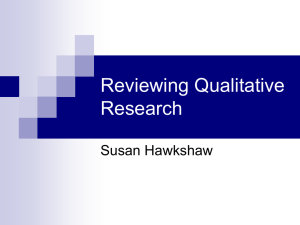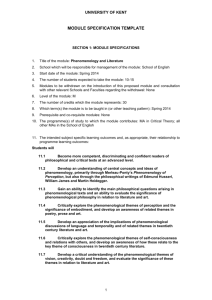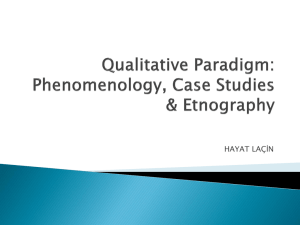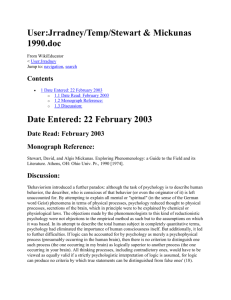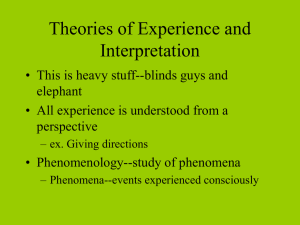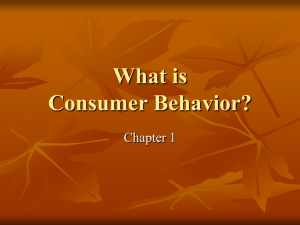Ways of Knowing Phenomenology Powerpoint
advertisement
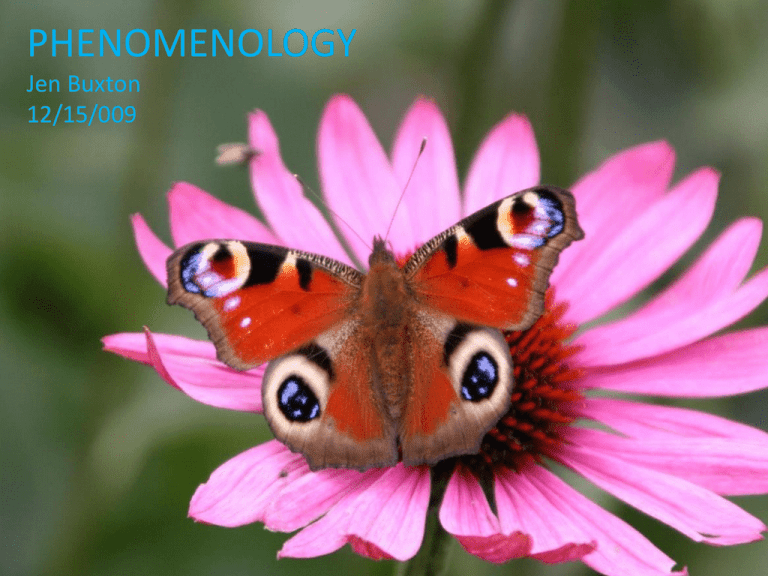
PHENOMENOLOGY Jen Buxton 12/15/009 Greek Derivation of Phenomenology Phainómenon + lógos “THE “THAT WHICH + STUDY OF” APPEARS” The Challenge of Understanding Phenomenology • The philosophy of Phenomenology is difficult to define because it had different meaning to each of the philosophers that developed it. • The definition of phenomenology evolved as each philosopher looked at the current accepted definition and added their own spin. • The core of the definition was conserved throughout its metamorphosis and current understanding is rooted in the original definition. General Overview • The philosophical movement began with Edmund Husserl in Germany during the 1920’s. He didn’t coin the term phenomenology, but he is responsible for igniting the movement. • The Phenomenological movement came after Positivism, which believed that meaning could only be derived through natural and physical experiences, excluding philosophy because it was not believed to be a rigorous science. • The goal of a phenomenological exploration is to develop awareness by systematically reducing the effects of bias (Yontef, 1993). General Definition of Phenomenology • Phenomenology uses systematic reflection and analysis to objectify subjective areas of consciousness and phenomena which appear in acts of consciousness; such as perception, judgment, and emotions. • Phenomenologists attempt to understand and examine life as it is actually lived based on the immediate perception of a phenomenon, an observable event. It believes that which is real through perception is valid to construct meaning. General Definition of Phenomenology • Their analysis and reflection is done from a first person point-of-view to study phenomena not as they appear to "my" consciousness, but to any consciousness whatsoever. (Kochler, 1986, p. 29). • It is believed that phenomenology can provide a firm basis for all human knowledge, including scientific knowledge, and could get philosophy recognized as a rigorous science. • It is sometimes depicted as the “science of experience”. Timeline of Phenomenologists Pre-Movement 1702 • Friedrich Christoph Oetinger 1711 • David Hume 1724 • Immanuel Kant 1728 • Johann Heinrich Lambert 1770 • G.W.F. Hegel 1838 • Franz Brentano 1848 • Carl Stumpf Prominent Figures in Phenomenology Edmund Husserl 1859-1938 Martin Heidegger 1889-1976 Maurice Merleau-Ponty 1908-1961 Edmund Husserl • Phenomenology grew through his attempt to find grounds for truth. • He was a mathematician turned philosopher. • A majority of his work was done in Freiburg, Germany which became a hotspot for the discipline. • He had a primordial, existing from the beginning, sense of being. And believed that knowledge is a priori. • His goal was to find the source, behind phenomena, an observable occurrence. (Kochler, 1986, p. 11). • He wanted to identify the origins of things through their immediate appearance. Edmund Husserl’s Method 1. Rule of the epoche 2. Rule of description 3. Rule of horizontalization 1. Rule of the Phenomenological Epoche • Husserl’s idea of the phenomenological epoche says that, “phenomenological description must focus on the aspects of our intentional acts and their contents that do not depend on the existence of a represented object out there in the extra-mental world” (Stanford Encyclopedia of Philosophy–Edmund Husserl, 2007, n. p.) • The epoche tells us to set aside/bracket biases and prejudices in order to suspend expectations. • It is the suspension of judgment while relying on the intuitive grasp of knowledge, free of presuppositions and intellectualizing. • He believed the epoche needed to be given precedence to pre-existing assumptions about an object or a conscious act. 2. Rule of Phenomenological Description • Description involves immediate and specific description of the observation of phenomena as it is given to consciousness. • Description does not involve bias or interpretation. Immediate Experience Versus Biased Experience • Biological Mimicry – to hide from predators Immediate Experience Versus Biased Experience Immediate Experience YUMMY BROWNIES Versus Biased Experience BACON BROWNIES 3. Rule of Phenomenological Horizontalization • Each item of the description is given equal value or significance, nothing receives priority. Three Main Themes of Husserl’s Phenomenology 1. Inter-subjectivity - how we concurrently see ourselves as objects, subjects, and part of the spatio-temporal world. 2. Empathy - the experience of inter-subjectivity is empathic in nature; we can put ourselves in other’s shoes. 3. Lebenswelt – Life world - beliefs are derived through socially, culturally, and/or evolutionary meaning constituted by a common language. (Stanford Encyclopedia of Philosophy, 2007, n. p.) Martin Heidegger • He was mentored by Husserl while working as his assistant in Freiburg, Germany. • He held many of the same doctrinal beliefs as Husserl but focused more on ontology, the nature of being, than epistemology, the study of knowledge. • Transformed Husserl’s definition of Phenomenology picking up where he left off. Martin Heidegger • He digressed from Husserl’s phenomenology with his introduction of the concept of Dasein, being-in-the-world. • He believed that the being is not primordial, as Husserl believed, rather it is derived from our understanding and interpretation of the world. • The bottom line in Heidegger’s phenomenology can be found in his most influential text, Being in Time. He said we need, “To let that which shows itself be seen from itself in the very way in which it shows itself” (Pietersma, 2000, p. 28). Three major components of Heidegger’s phenomenology 1. Phenomenological reduction – suspending judgment about the natural world that precedes phenomenological analysis. 2. Phenomenological construction – projecting the given on to a being. 3. Phenomenological destruction – traditional concepts are broken down into their sources • He thought, much like Descartes, that in order to successfully construct meaning in philosophy, there must be destruction (The Basic Problem of Phenomenology, 2009, n. p.). Maurice Merleau-Ponty • Like Heidegger, his beliefs stemmed from Husserl’s work • His philosophy differed than those before him because viewed science as secondary to experience. He felt that before scientific investigation the elements of basic experience must be clearly understood Maurice Merleau-Ponty • He was an existential phenomenologist. • Existential Phenomenology is the study of the essences, existences, of perception and consciousness as well as a method of describing the nature of our perceptual contact with the world. • Perception - “a preconscious moment that the external comes in contact with the body” (Wyatt’s Existential Primer, 2009, n. p.) • He emphasized physical existence and perception as the method for understanding existence. He believed that perception attains meaning through physical experience, and that meaning begins with perception. Major Figures Ways’ of Knowing • Husserl approached knowing in an attempt to objectively identify the internal structure of cognition through a first person point of view (Pietersma, 2000, p. 8). He saw knowledge as an endpoint of the search for truth rather than belonging to truth (Pietersma, 2000, p. 38). • According to Heidegger, knowledge does not being internally, it is an attitude that can develop from prior, and different experiences, that come from our situatedness as beings in the world (Pietersma, 2000, p. 125). For Heidegger knowing must be fused with reflection and integration into the grander scheme of things (Pietersma, 2000, p. 87). • Merleau-Ponty’s doctrine of knowledge developed through his phenomenological beliefs of perception. He held that perceptions, in the matter of knowledge are always valid and as a result he didn’t believe that anything can be certain (Pietersma, 2000, p. 127). Four Major Stages of Phenomenology Realistic Constitutive • 1920’s through today • Its emphasis is on the search for the human “essence” including their motives, actions, and selves. • extended beyond realistic phenomenology to include the philosophy of natural sciences • The goal was identify inter-subjective ground in the world and its relation to science Existential Hermeneutic • Dominated the movement in 1940’s and 1950’s • The belief was that to be complete, phenomenology must include observation and analysis of a being in the world • Prevalent in the 1970’s and 1980’s • The emphasis shifted again to include the awareness that human existence needs to be viewed as interpretative. Seven Widely Accepted Features 1. 2. 3. 4. 5. 6. 7. Everything in phenomenology must be observable. Phenomenologists, for the most part, are opposed to naturalism, objectivism, and positivism. Cognition, according to a phenomenologist, is justified as the “awareness of a matter itself as disclosed in the most clear, distinct, and adequate way” (Marcelle, 2005, n. p.). Phenomenologists also believe that all objects in the natural world are observable therefore can be known. They believe that inquiry must be approached through encountering objects and subsequent reflection followed by description. Description must be universal, a priori, in explanation of cause, purpose, or grounds of knowing. There is an ongoing debate on Husserl’s transcendental phenomenological epoche, which will be discussed more in depth within the section on Husserl (Marcelle, 2005, n. p.). Suggested Text Resources Primary Text Resources Secondary Text Resources • Edmund Husserl Logische Untersuchungen, Logical Investigations (1913) • Pietersma, H. (2000) Phenomenological Epistemology • Kochler, H. (1986). Phenomenological realism – selected essays. • McGrath, S. (2008). Heidegger a (very) critical introduction • Edmund Husserl Pure Phenomenology (1931) • Martin Heidegger Being and Time (1927) • Maurice Merleau Ponty Phenomenology in Perception (1954) Suggested Website Resources Phenomenology online. www.phenomenologyonline.com Center for advanced research in phenomenology. http://www.phenomenologycenter.org Merleau Ponty’s phenomenology of perception. http://www.angelfire.com/md2/timewarp/merleauponty.html Phenomenology – Edmund Husserl. http://science.jrank.org/pages/10639/Phenomenology-Edmund-Husserl.html Stanford Encyclopedia of Philosophy – Edmund Husserl. http://plato.stanford.edu/entries/husserl/ Stanford Encyclopedia of Philosophy – Maurice Merleau-Ponty. http://plato.stanford.edu/entries/merleau-ponty/ The basic problem of phenomenology and introduction. http://www.marxists.org/reference/subject/philosophy/works/ge/heidegge.htm Wyatt’s Existential Primer. http://www.tameri.com/csw/exist/merleau.shtml Procedures for Conducting a Phenomenological Study • Research questions explore the meaning of lived experiences for individuals, and asks individuals to describe these experiences. • Data is usually gathered through interviews of those who have experienced the phenomenon being investigated, with the awareness of bracketing bias or interpretation. • Data analysis involves horizontalization. Significant statements are clustered by meanings and connected to make a general description of what was experienced and of how it was experienced. • The researcher can unbracket bias and interpretation at this point. • Finally, conclusions are made and the report is written such that readers understand better the structure of the experience. • The reader should come away with a better understand of what it is like for someone else to experience something.” In conclusion… • Phenomenology is one of the most influential philosophical movements of the 20th century that has sparked many subsequent philosophical movements such as existentialism, post-structuralism, post-modernism, and feminism. • Phenomenology is a method for the examination of the essential framework of consciousness. Through examination we can identify certainty of the framework of consciousness by bracketing the nonessentials and focusing on the fundamental rules consciousness uses to create knowledge (Phenomenology– Edmund Husserl, 2009, n. p.). Hmmmm?????
